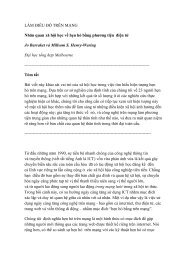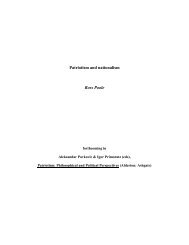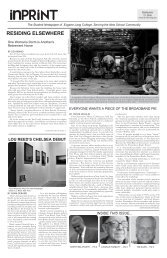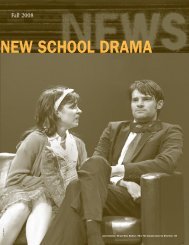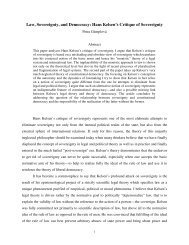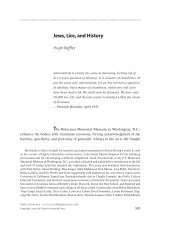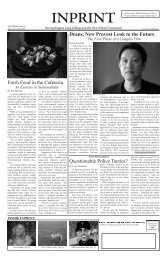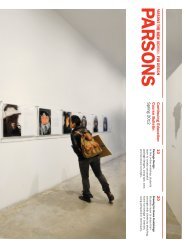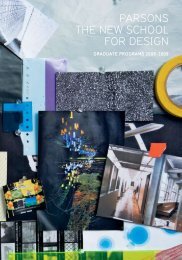The Mannes Opera: Hitting the High Notes - The New School
The Mannes Opera: Hitting the High Notes - The New School
The Mannes Opera: Hitting the High Notes - The New School
You also want an ePaper? Increase the reach of your titles
YUMPU automatically turns print PDFs into web optimized ePapers that Google loves.
Edward Aldwell Honored<br />
THE EDWARD ALDWELL PROFESSORSHIP IN<br />
THE TECHNIQUES OF MUSIC<br />
<strong>The</strong> <strong>Mannes</strong> community – and <strong>the</strong> world<br />
of music – suffered a tragic loss on May 28,<br />
2006, when <strong>the</strong> noted pianist, pedagogue,<br />
and music <strong>the</strong>orist Edward Aldwell, a<br />
<strong>Mannes</strong> faculty member since 1969, died of<br />
injuries he had suffered in an accident<br />
earlier that month. (See “In Memoriam” in<br />
<strong>Mannes</strong> <strong>New</strong>s, winter 2006.)<br />
In an act of extraordinary generosity, his<br />
estate has made a gift of $1.5 million – <strong>the</strong><br />
largest single contribution <strong>Mannes</strong> has ever<br />
received – to establish <strong>the</strong> Edward Aldwell<br />
Professorship in <strong>The</strong> Techniques of Music.<br />
<strong>Mannes</strong>’s very first endowed professorship<br />
will honor <strong>the</strong> work and art, <strong>the</strong> intellect and<br />
spirit, and <strong>the</strong> life and legacy of Edward<br />
Aldwell.<br />
THE EDWARD ALDWELL MEMORIAL CONCERT<br />
On Monday, September 25, 2006, <strong>the</strong><br />
<strong>Mannes</strong> family ga<strong>the</strong>red in <strong>The</strong> Concert<br />
Hall to mourn <strong>the</strong> loss and celebrate <strong>the</strong> life<br />
of Edward Aldwell. Three of his former<br />
students performed music he cherished.<br />
Thomas Sauer, member of <strong>the</strong> piano faculty<br />
and of <strong>The</strong> <strong>Mannes</strong> Trio, performed Ricercar<br />
a 3 and Ricercar a 6 from Bach’s <strong>The</strong> Musical<br />
Offering. Mei-Ting Sun played Chopin’s<br />
Preludes, op. 28, nos. 9-24. And piano<br />
faculty member Yuri Kim offered<br />
Beethoven’s Sonata in C minor, op. 111.<br />
Carl Schachter, Ed’s teacher, friend,<br />
colleague, and co-author of <strong>the</strong> groundbreaking<br />
and widely used textbook Harmony<br />
and Voice Leading, offered remarks that with<br />
great eloquence and perception expressed<br />
both his own thoughts and feelings and <strong>the</strong><br />
sentiments of those present.<br />
<strong>The</strong> published program book for <strong>the</strong><br />
event includes tributes from many of his<br />
friends, colleagues, students, and admirers.<br />
Four of <strong>the</strong>se by longtime fellow members<br />
of <strong>the</strong> Techniques of Music faculty are<br />
reprinted below.<br />
10<br />
My first teacher of Schenkerian analysis<br />
was Ed Aldwell. It was my first year at<br />
<strong>Mannes</strong>, and I was a teenager at <strong>the</strong> time.<br />
Like many a new student, I simply went to<br />
<strong>the</strong> class to which I was assigned, without<br />
having any idea that I was about to study<br />
with one of <strong>the</strong> giants of <strong>the</strong> music world.<br />
<strong>The</strong> class was like none o<strong>the</strong>r I had thus far<br />
experienced. All <strong>the</strong> analytic concepts that<br />
Ed taught in <strong>the</strong> class were bound up with<br />
an approach to performance, and vice versa.<br />
A particular highlight of each class session<br />
was when Ed would sit at <strong>the</strong> piano and<br />
play <strong>the</strong> piece that was being analyzed.<br />
For instance, one day Ed and Yakov<br />
Kreizberg (who was about 16 years old <strong>the</strong>n)<br />
played a four-hand arrangement of <strong>the</strong> first<br />
movement of Beethoven’s String Quartet in<br />
C minor, op. 18 no. 4 for <strong>the</strong> class. I confess<br />
that I had never heard <strong>the</strong> piece before. Not<br />
surprisingly, I was overwhelmed by <strong>the</strong><br />
performance.<br />
Ever since <strong>the</strong>n, whenever I hear op. 18<br />
no. 4, I think back to that day when I and a<br />
handful of o<strong>the</strong>r lucky students were treated<br />
to a very special performance by a very<br />
special person.<br />
—Poundie Burstein<br />
Quem virum aut heroe lyra vel acri/ tibia<br />
sumis celebrare, Clio? – What man or hero<br />
will you celebrate most on your lyre or<br />
bright-toned flute, Clio? Passages from<br />
Horace keep running in my head now when<br />
I think of Edward. Our conversations about<br />
matters having to do with music, music<br />
<strong>the</strong>ory and departmental matters at <strong>Mannes</strong><br />
and Curtis where we both taught would<br />
often veer into discussions of recent reading.<br />
Talking about literature was a side of our<br />
relationship that meant a great deal to both<br />
of us. Friend, philosopher – also guide: it was<br />
Edward who gave me invaluable advice about<br />
<strong>the</strong>ory teaching when I first began teaching<br />
<strong>the</strong>ory at <strong>Mannes</strong> in 1974. Light and playful<br />
in manner as he often was, he was possessed<br />
of true seriousness and dedication, and if ever<br />
a man deserved to be remembered with<br />
words of Horace, it was he.<br />
—Robert Cuckson<br />
Although I met Ed for <strong>the</strong> first time when<br />
we were both students, I only came to know<br />
him well when we became “double<br />
colleagues,” teaching at both <strong>Mannes</strong> and<br />
Curtis, especially since commuting by<br />
Amtrak provided many opportunities for<br />
unexpectedly extended conversations. I also<br />
remember that when my future wife first<br />
arrived in <strong>the</strong> United States speaking<br />
virtually no English, Ed made real efforts to<br />
communicate with her, something which<br />
both of us appreciated. He was never<br />
loquacious, but always communicated<br />
expressively. This must have been especially<br />
true in his teaching, as all of his students<br />
remained fiercely loyal, even many years<br />
after concluding <strong>the</strong>ir studies. Among his<br />
many gifts he had a perfect sense of how to<br />
keep a discussion focused on <strong>the</strong> main<br />
objective, always found effective and brief<br />
remarks, tinged with his uniquely sardonic<br />
humor, which brought <strong>the</strong> rest of us back<br />
into line. All of us will miss him for what he<br />
brought us, what he taught us, but most of<br />
all for his sense of <strong>the</strong> highest standards.<br />
—David Loeb<br />
I first met Edward Aldwell in <strong>the</strong> 1960s<br />
(I don’t remember <strong>the</strong> year), when he began<br />
studying <strong>the</strong>ory and Schenkerian analysis<br />
with me; at that time he was still a piano<br />
student at Juilliard. Ed worked with me for<br />
several years, mostly on analysis but also on<br />
invertible counterpoint. We became and<br />
remained very close friends, and in <strong>the</strong><br />
1970s we collaborated on <strong>the</strong> book<br />
Harmony and Voice Leading.<br />
Ed joined <strong>the</strong> faculty of <strong>the</strong> <strong>Mannes</strong><br />
College in 1969, and in 1971 he began<br />
teaching at <strong>the</strong> Curtis Institute; he remained<br />
on both faculties until his death. In his early



